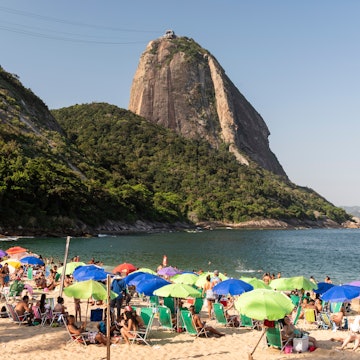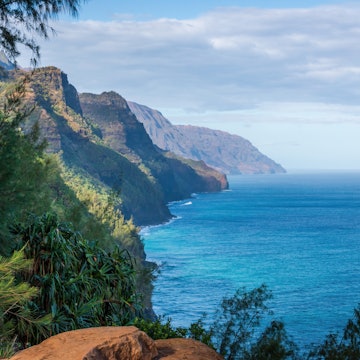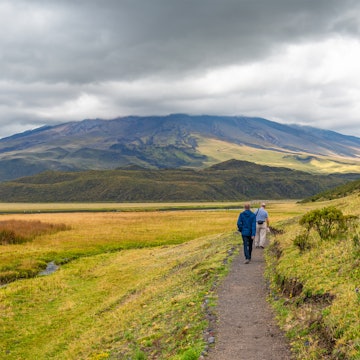

The Galápagos Islands promise thrilling encounters with nature – especially under the water. Lindsey Lu/Shutterstock
A paradise for anyone who loves wildlife and raw nature, the Galápagos Islands contain wonders you’ll find nowhere else on earth.
Plying the islands’ shores and coastal waters are Galápagos giant tortoises that weigh more than 500 pounds. Marine iguanas that swim and eat seaweed and algae.
Blue-footed boobies (seabirds), Galápagos penguins and many other incredible creatures. Such unique biodiversity has earned the archipelago a UNESCO World Heritage Site designation.
Many visitors see the islands on a multi-day small-boat cruise, while others explore on land, hopping on ferries to get between islands. Either way, you will need to be with a certified guide at visitor sites in the national park, which composes 97% of the islands’ landmass.
As you plan your first trip to this wondrous place, read on for more tips to keep in mind.
When should I go to the Galápagos Islands?
The most popular time to visit the Galápagos Islands is during the warm season, from December to May. This time of year sees only intermittent rainfall, while air temperatures stay in the high 80s to low 90s F (30–34°C) – making the water lovely for swimming and snorkeling.
The June-through-November cooler season brings stronger winds and cooler air temperatures, but it’s still a nice time to visit. Since the islands are located near the equator, you can expect around 12 hours of sunlight each day year-round.

How much time should I spend in the Galápagos?
If you come all the way to the Galápagos, you’ll probably want to spend at least a week here – with four or five nights a bare minimum. Two weeks is a good length of time for more in-depth exploration. Many cruise companies split the islands into eastern and western itineraries.
Since the islands are both remote and fairly spread out, you should research in advance which ones you want to call at.
Keep in mind you will need to get between islands, which can take some time when traveling independently. If you join a multi-day cruise, you’ll likely be in transit between islands at night, allowing you to fully enjoy activities during the day.
Is it easy to get in and around the Galápagos Islands?
It takes some effort to get to the Galápagos Islands, which are 600 miles (956km) off the coast of mainland Ecuador. Most visitors fly from Quito or Guayaquil into one of the islands’ two main airports.
Keep in mind there are strict agricultural regulations in place, including a declaration and inspection. You’ll need to pay a park entrance fee of $200 for adult international visitors (this must be paid in cash upon arrival), as well as a $20 Transit Control Card.
Multi-day cruises are very popular, with vessels and amenities that range from budget to luxury; just about all cruise operators offer activities like snorkeling, hiking, kayaking or scuba diving.
Independent travelers can find accommodations on a few islands, including Santa Cruz, San Cristóbal and Isabela. To get between some islands, take an inter-island ferry (tickets are available at shops and ticket booths); there are also a few propeller-plane flights between select islands.
To see the sites, book half- or full-day excursions – but keep in mind you need a certified Galápagos National Park guide with you to visit most sites. To get around, take a taxi, rent a bike or just walk.
Top things to do in the Galápagos Islands
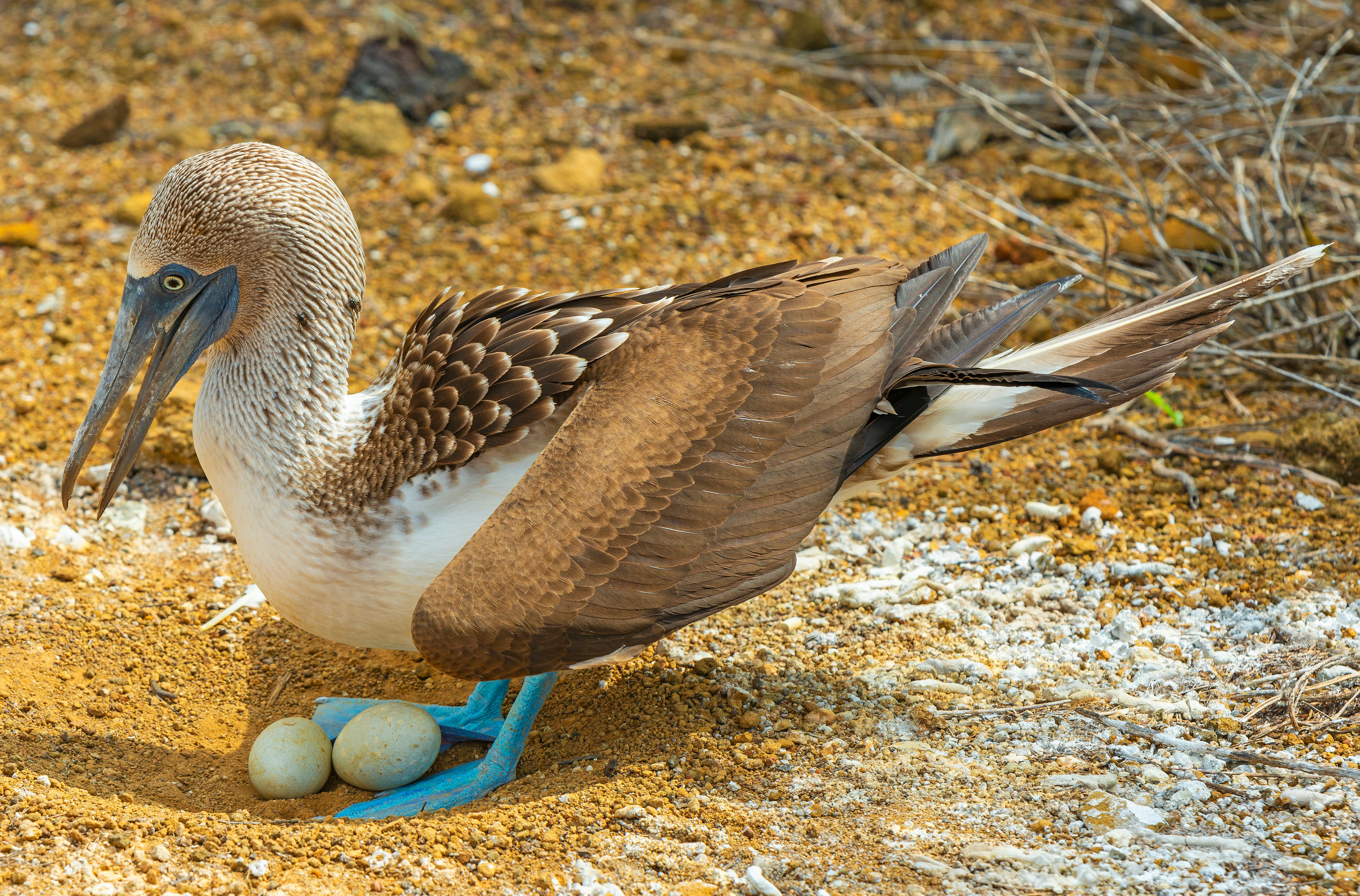
Spot blue-footed boobies on a hike
Join a guide to hike and explore the terrain on foot. North Seymour Island is just one of many locations with great places to walk, including a popular trail where a stroll among prickly pear cactus and palo santo trees will let you see species like like blue-footed boobies, great frigate birds, Galápagos sea lions and marine iguanas.
Snorkel with penguins off Bartolomé Island
While many species stick to land, many more are in the sea, and snorkeling provides an excellent vantage point for encountering them. (If you have your own mask, consider bringing it from home to ensure just the right fit).
Join a tour to go for a snorkel in locations like Bartolomé Island – a great place to see penguins.
Set out on bucket-list SCUBA opportunities
Experienced scuba divers place the Galápagos Islands on their bucket lists for good reason, for the Galápagos Marine Reserve teems with underwater wonders.
On a scuba trip, you’ll see spotted eagle rays, manta rays, Galápagos garden eels, bonitos, hammerhead sharks, Galápagos sharks, Pacific seahorses, Galápagos giant sea turtles and much more.
Keep in mind that the area’s strong currents and swells make it a challenging environment, one best suited to experienced divers.

Get a scientific take at the Charles Darwin Research Station
In Puerto Ayora, stop by the Charles Darwin Exhibition Hall at the Charles Darwin Research Station to take in exhibits about scientific research on the islands and see natural-history specimens, including whale skeletons.
Be sure to spend some time strolling around the native gardens, and grab a ticket for a tour of Ruta de la Tortuga (“Tortoise Route”), along which you’ll spot Galápagos giant tortoises.
My favorite thing to do in the Galapagos
Some places have their “Big 5.” The Galápagos are so wildlife-rich that they have a Big 15.
Every time I visit, I love to check off as many species as possible – penguins, iguanas, tortoises and blue-footed boobies, of course, as well as such other species as flightless cormorants, red-footed boobies, Galápagos hawks, Santa Fe iguanas, Nazca boobies, Galápagos flamingos, Galápagos albatrosses, Galápagos fur seals, land iguanas…have we gotten to 15 yet?

How much money do I need for the Galápagos Islands?
Ecuador uses the US dollar, but since there are a limited number of ATMs on the Galápagos, you should bring cash with you, especially smaller denominations. Tipping is customary for guides and boat staff.
The cost of a visit to the Galápagos Islands can vary widely, with a wide variety of multiday cruise ships and accommodations available, from basic rooms to luxurious ecolodges. If you book a cruise, be sure to find out what is and isn’t included – think meals, guides and activities.
Every visitor will need to budget for the park entrance fee and Transit Control Card, which may be included in the cost of some cruises.
Transit Control Card: $20
Park entrance fee: $200 (for adults from outside Ecuador, payable in cash)
Basic accommodations: $40–100+ per night
Luxury accommodations: $500–1000+ per night
Meals: $20-40 per day
Inter-island ferry: $30–60 one way
Liveaboard boat, basic to luxury: $2000–20,000
Tours: $60–250
Do your part to protect Galápagos National Park
Be sure to follow all the rules in Galápagos National Park, including sticking to trails and permitted areas, and giving wildlife plenty of distance. Never disturb, touch or feed any animals, and be sure not to use a flash when taking pictures.
Respect plants by leaving them be, and be sure not to transport anything – even sand –between the islands. Before you leave, read up on all the biosecurity rules of this unique ecosystem, and be sure not to bring any agricultural products to the islands.
You’ll need to complete a declaration and are subject to inspection.
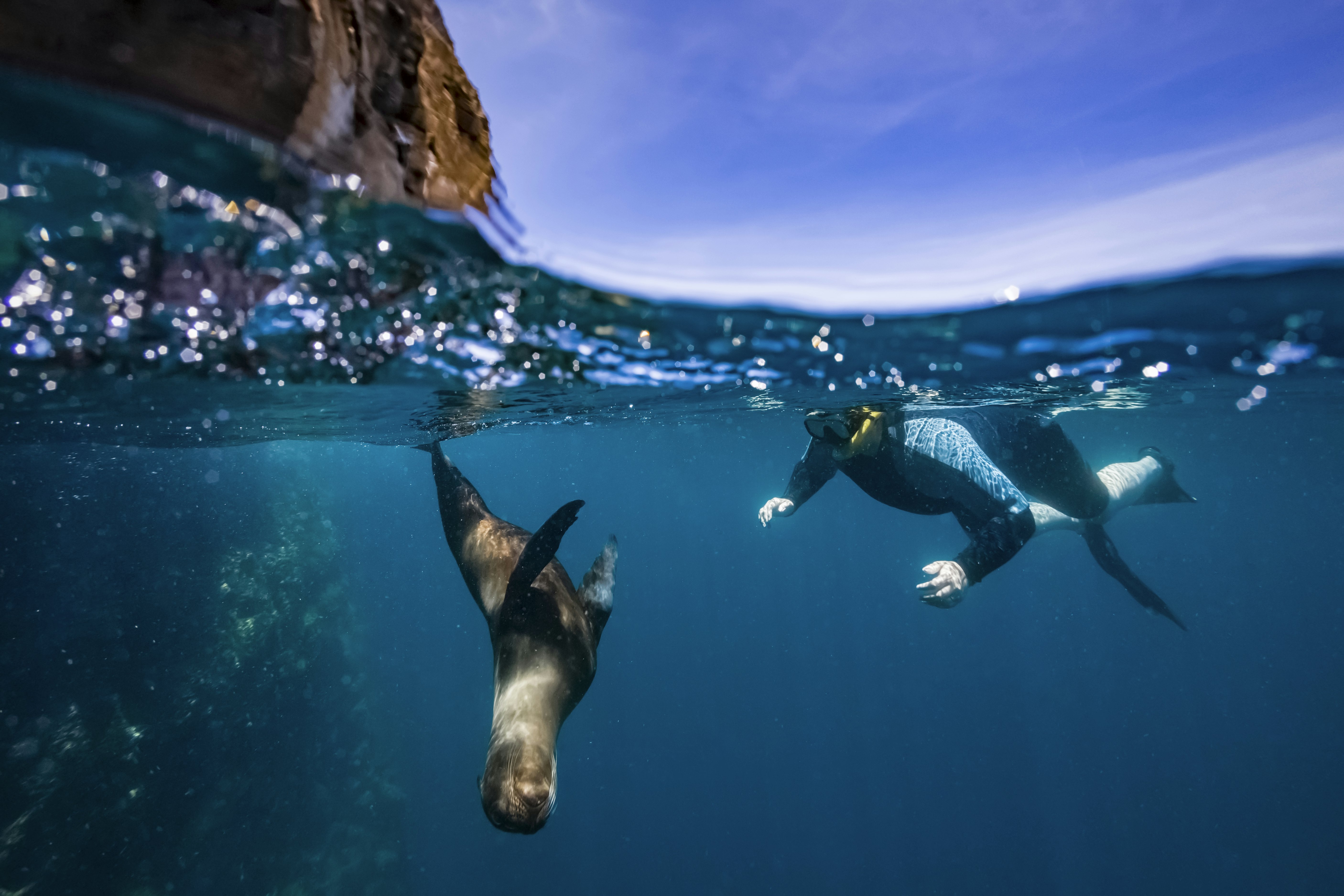
Packing tips for the Galápagos Islands
Since the equatorial sun is always strong, be sure to bring sunglasses, reef-friendly sunscreen, SPF lip balm, a wide-brimmed hat and UPF clothing. Insect repellent and a water bottle to stay hydrated are also musts.
For clothing, you’ll want to bring a water-resistant day pack, rain jacket and rain pants, swimsuits and rash guards along with a dry bag or plastic bags to keep out the moisture.
You won’t need to dress up, but you’ll want comfortable walking shoes and sport sandals for water landings in the boat.
Pack sturdy sandals rather than flip-flops for this, since you don’t want to risk walking barefoot on sharp corals.
Most importantly, bring binoculars and camera gear to see and photograph the incredible scenery and wildlife you can count on spotting.







